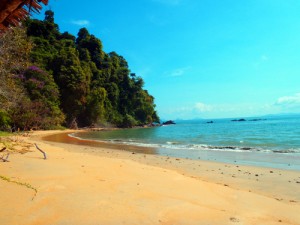Andaman Discoveries provides the support and travel information you need to make the most of your time in village. We have developed support materials including a Visitor’s Guide and Thai Phrasebook, and have experienced staff to answer all your questions before you leave home! Please take some time to read through the chapters below to prepare yourself and to make the most of your time with us.
The beauty of the villages in which we work in and assist are off the typical beaten tourist path, so it’s unlikely that you’ll see another tourist during your time in village. This is what makes the villages so special.
The essence of the form of tourism that we are helping the villagers to participate in is one that doesn’t sacrifice their traditional way of life or culture for the sake of mass tourism. We have used our experience in village to create hands on activities and support materials to allow you to really connect with the villagers that you meet. You feel like a member of the family, not an anonymous ‘tourist.’ You’ll be accompanied by a translator so that you can ask questions to local guides (who can’t speak English but who we want to continue to support and encourage) and villagers throughout your trip.
Staying in village will allow you to experience how other people live, work, relax and even perceive the world. Awareness of cultural differences allows you to understand and appreciate the villagers’ way of life. We have worked closely with the villagers to create some in village guidelines to help you know what to expect during your time in village. By respecting the local culture you will have a more enriching cultural experience.
Code of Conduct
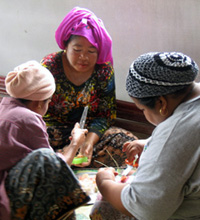
Thailand is a diverse country with many different religions and customs. Please take note of the following points in order to respect the villagers who are welcoming you into their homes.
- There is no alcohol or pork allowed in Muslim villages, please respect this important village protocol
- It is customary in Thailand to remove shoes before entering a house
- In traditional Thai culture women dress modestly. When visiting villages women should keep shoulders covered and avoid short skirts. It is acceptable to wear swimsuits on the beach but we recommend wearing a t-shirt as well
- It is not normal for Thai people to show strong affection in public, please refrain from doing so whilst in the villages
- Please ask before taking photographs
- We advise you not to take valuables on the trip; if you choose to, be sure to keep them in a safe place at all times
- Please do not feed monkeys or other wild animals
- Take only photos, leave only footprints! Please respect this protocol and do not take shells or coral from the beach or sea — leave them where they can be appreciated by all, do not take illegal souvenirs. Please see the CITES website to know what you are not allowed to take. https://cites.org/eng/disc/species.php
In-Village Guidelines
Eating
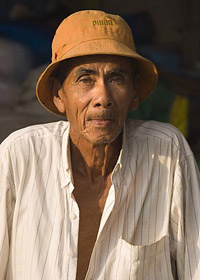
Eating with your homestay family will certainly be one of the highlights of your trip; you will be surely fed until fit to burst. The Thai way of eating is quite different from Western methods. Thais use a fork and a spoon instead of a knife and fork. The fork is used to push food onto the spoon and then the spoon is the one that goes in the mouth. Don’t worry if this feels a bit strange; just carry on using your fork. Chopsticks are generally used only for noodle soup (gwit teaow naam).
The Thai style of eating is to place all dishes in the center. Each person will have their own plate with a portion of rice on it. From one of the main dishes in the middle take a small portion (using a serving spoon if provided) and place it on your rice. Don’t load a complete meal on to your plate right away. Just serve yourself a little bit at a time. If in doubt, watch how others do it.
Thai food tends to be quite spicy. If you do get caught with a chili, eat some rice — it’s a better way to cool your mouth than water. Do let us know of any dietary requirements in advance, but also be willing to try new things.
Comfort
Villagers will make the utmost effort to ensure your comfort. However they do live in a more traditional way and are not used to the levels of comfort to which many people are accustomed. In the homestay you can expect to be given a foam mat with under sheet, a mosquito net, blanket and pillow as sleeping arrangement.
In the bathroom
In the bathroom most homes have an Asian style toilet, a bucket for washing, and no hot water. The traditional way to shower is to use a small bowl which is dipped into a large pot of water to rinse with. It’s not common to have hot water. Some houses do have Western-style toilets.
Going to the bathroom in a different country can be an experience in itself. Many of the toilets your will encounter here will be the Asian style “squat toilet.” They can appear a bit unusual at first, but apparently it’s a more ergonomic way to ‘go.’ Place your feet on either side, bend your knees and squat. (Those who do yoga will find it easier!) Watch your trouser legs! You can then use the squirt hose or bowl to rinse. Don’t forget to flush the toilet by pouring water into it. If you do use toilet paper, please place it in the bin provided, not down the toilet.
Health
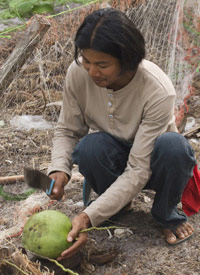
The majority of village activities are designed as ‘soft’ adventures. These can be enjoyed by any person in reasonable health, but be prepared for some physical exertion and challenges. These include climbing on to long-tail boats, using ladders to reach the boats, walking through rough terrain and on raised bridges. Please advise us of any special needs or medical conditions before the tour so that we can assess its suitability for you.
Tipping
Please do not tip individuals or give presents (e.g. toys, candy) to the children. This can lead to an expectation from the children each time they see a visitor. Making a donation to the community fund is recommended. Ask a member of staff for more details.
Host family gift ideas
If you are staying with a family, it might be nice to give them a small gift to show your appreciation and something that they can remember you by. A little ornament or trinket is fine. Children love to draw and be creative, so think about some picture books and coloring pencils for the children in your homestay.
Taking photographs
Please respect the villagers and locals and remember not to treat them as simple subject matter for your holiday pictures. Always ask before taking pictures, or alternatively, simply point to your camera and make an OK sign.
Cultural Introduction to Thailand
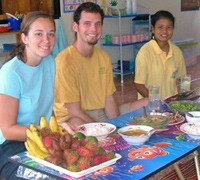
There’s no doubt about it, Thailand is a wonderful place full of wonderful people. For this reason we would like to enlighten you about a few cultural points that will make your stay here more enjoyable and comfortable for both you and the locals.
Royalty
Thailand is a constitutional monarchy, and the King and Royal family are devoutly revered. Do not disrespect the King in any way. Please treat anything with His image on it, including money, with respect. It’s best not to talk about Royalty to avoid any misunderstandings.
Monks
Buddhist monks are a common sight all over Thailand and are easily recognized with their orange robes and shaved heads. It is strictly forbidden for male monks to have direct physical contact with women. This includes handing them something. It is acceptable for women to offer a gift by placing it on the ground in front of a monk and backing away, or by giving it to a man to offer for you. Men can come in direct contact with monks. Please always treat monks with the utmost respect, speak respectfully and ‘wai’ when greeting, saying goodbye, and thank you.
Why ‘wai’?
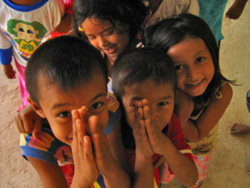
The wai, putting your hands in a prayer-like position, is used to greet, pay respect, thank, and say farewell. When and how you wai someone depends on two things: status and age. Thai people do not wai people of the same age; they wai older people and those of a higher status (like monks). If a child wai’s you, there is no need to wai back, just smile and say hello.
Pe or Nong?
Pe loosely translates into older brother or sister and Nong younger brother or sister. You will hear people referring to each other as either Pe [name] or Nong [name]. There is not really an English equivalent. If someone is older than you, you can call them Pe and if they are younger than you Nong. It’s a great way to avoid embarrassment if you forget someone’s name as you can just call them Pe or Nong. For Muslim people it’s Bang [name] and Nong Baow [name].
Mai pen rai
You’ll hear Mai pen rai a lot during your trip. It translates into not at all, you’re welcome, no problem, it doesn’t matter, no worries, never mind. ‘Mai pen rai’ is typically Thai and shows consideration for others, conflict and anger avoidance, and a desire for peace.
Greng jai – to have consideration for other’s feelings
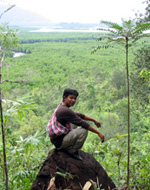
Understanding the meaning of greng jai reveals a lot about Thai’s and their way of thinking. It loosely translates into ‘to have consideration for others’. In reality, it means thinking about how what you might say or do will affect others around you. It allows Thais to avoid conflict, awkward challenges, conflicts, and basically any difficult or unpleasant situation. In many cases, a Thai will decide not to act or speak a lot more than westerners would. Keeping their opinions to themselves avoids conflict and being disrespectful to their peers.
Jai yen – chill out
This translates into “cool heart” and means to keep your cool and to calm down if you feel yourself getting a bit hot under the collar for whatever reason. Being jai rawn or hot-hearted displays a lack of self control, rudeness, and poor attitude which can make others “lose face.” This all relates to the Thai’s avoidance of confrontation. In Thailand it is considered disrespectful to put someone in a position where they ‘lose face’. Whatever happens, keep your cool and do not raise your voice or lose your temper.
A simple solution to avoid making another person “lose face” is to turn a criticism into a polite request. For example:
- Criticism: There’s something wrong with the door to my room, it won’t shut.
- Request: I was wondering if you could help me. I couldn’t shut the door to my room and I wasn’t sure if I was opening it correctly.
This has allowed the person you are dealing with to “save face” as it was not a direct criticism of their door, more like your inability to make it work! This is more polite than complaining and will increase your chances of receiving the help you need.
Cultural Guidelines
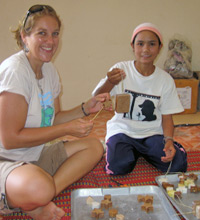
- It is considered quite rude to touch a person’s head, though it is not a problem with young children.
- Avoid pointing your feet at anyone or anything and do not put them up on tables or chairs.
- It is customary to remove your shoes when going indoors, especially in someone’s home or in a temple. Look for a pile of shoes out front and follow suit!
- Do not be surprised if a Thai person asks you personal or direct questions, like “How much do you earn?” or “Are you married yet?” They do not mean anything by this; in Thai culture it’s perfectly acceptable to ask these types of questions. If someone asks you if you are married or have a partner, they are not chatting you up, they are just curious.
- Westerners are referred to as farang, which is also the Thai word for guava. They may refer to you as a ‘farang’ or simply say “You, you, you” to get your attention. Don’t get offended by this, they are just being friendly and may not have the English skills to be polite.
What to Bring
- Sunglasses
- Insect repellant
- Camera, film, and extra batteries
- Sandals, flip-flops, and trekking shoes
- English – Thai dictionary
- Photos of your family, hobbies, and friends, as villagers are always interested in learning about other cultures and lifestyles (avoid pictures that flaunt “wealth” — your home or car, for example).
- Swimming costume (shorts and a T-shirt)
- Rain coat for the green season (June – Oct)
- Several t-shirts that cover the shoulders
- Sun hat
- UV Sunscreen
- Personal medication
- A sarong (suitable for wearing to and from the bathroom)
- A souvenir from your country as a present for hosts (not expensive or luxurious, just something fun like a postcard or calendar)
- Torch (flashlight) and extra batteries
- Binoculars (if you have them)
- Plain white t-shirt or dress (if you’re doing a batik activity)
Services in Kuraburi
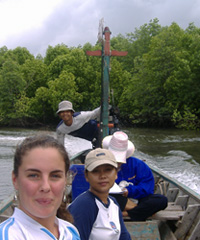 Kuraburi is a small town, so don’t worry about getting lost. If there is anything in specific you do need to know about, just ask a member of Andaman Discoveries staff.
Kuraburi is a small town, so don’t worry about getting lost. If there is anything in specific you do need to know about, just ask a member of Andaman Discoveries staff.
Sustainable Transport:
We recommend that guests walk or use low impact forms of transportation whenever available. For public transportation, we suggest using buses, trains or join with a group van as gropu travel has less impact than privateJ
Low Impact Forms of Travel In and Around Kuraburi
Kuraburi is a small enough place to walk around or use a bicycle from the Kuraburi office, but motorbike taxis are situated outside of the market and can be hired for distances that are just too far to walk. We can also organize transportation for longer distances and activities.
Public Transportation
- Public Buses are available both with AC and with no AC, tickets can be bought at the Kuraburi bus station. Bus routes run North to Bangkok , where you can get additional buses or a train to the Northeast and North South. If you are heading South to provinces in the Southeast or Southwest, you can take a public bus to Takua Pa and then change buses or get a join with a group van, or head to a neighboring province that has a train station. For details or time tables, please ask at the bus station or an Andaman Discoveries staff member.
- Join with a group vans (most of these leave from Takua Pa bus station)
- Trains from partnering provinces (closest is Surat Thani)
- Private van or car transfer-book directly through Andaman Discoveries
Internet
There is an Internet Café called “Friends De Sea” near the bus station. It is run by Pe Bee and Pe Da, both of whom speak very good English and make a great cup of coffee!
Dining
Local restaurant, located at the Kuraburi town serves excellent Thai and Western cuisine and has an English menu (open all year round). Great food is also available year-round at “the strip,” a row of restaurants next to the main road and the bus station. These restaurants offer a wide selection of Thai food, including Muslim pancakes called roti, which you can order with curry or banana (please do not drink alcohol at this restaurant).
Money
There is a bank, ATM, and post office in town on the opposite side of the road from the bus station that is open from 9am until 4pm. Money can be exchanged there.
Shopping
There is a daily market across the road from the bus station selling fruit, vegetables, Thai snacks like fried bananas and sticky rice, as well as clothes. On Tuesday and Saturday mornings there is a larger market in the same place.
Massage
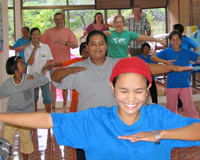
For Thai massage there is a place about a five-minute motorbike taxi away, towards Ban Talae Nok. Most motorbike taxis will know where it is.
Laundry
Boon Piya has a laundry service. The owner, Ger Hooey, normally has it done in one day. It usually costs about 40 Baht for one plastic bag.
Important telephone numbers:
- District Office +66 (0)76 49 1353
- Kuraburi Hospital +66 (0)76 49 1353 or 1669
- Police Station +66 (0)76 49 1275-7 or 191
- Fire Fighter +66 (0)76 49 1352 or 191
- Post Office +66 (0)76 49 1100
- Bus Station +66 (0)76 49 1218
Tips about Thailand
Currency in Thailand
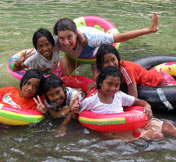
The currency in Thailand is Thai Baht. Currency rates can change daily, so you should check current rates to get the latest exchange rates for the value of the baht.
Climate and weather
Thailand is at its best from November to early May. In the South, the months of March and April are hot, but less so than other parts of Thailand. In the monsoon season from June to October you can expect frequent rain (usually downpours of short duration) and increased numbers of bugs. Vegetation is also at its peak of lushness at this time producing an array of tropical fruit, and monsoon showers are usually followed by blue skies and brilliant sunsets.
Medical requirements
For visitors from most nations, no vaccinations are required or recommended for entry into Thailand. Medical care of a high, international standard, is available at many hospitals in Bangkok, Phuket, and Chiang Mai, and costs are well below those for equivalent attention in other countries.
Chikungunya and Dengue
The Chikungunya and Dengue viruses are present in Thailand. These illnesses are spread by day-biting mosquitoes, so the best way to prevent infection is to wear clothing that covers all extremities and use insect repellent with substances such as DEET. Travelers are also encouraged to sleep under a mosquito net.
Malaria
Malaria is not a major risk in Thailand, but the risk is present. It is higher in the rainy season. Thai Malaria Division of the Thai Department of Public Health issues the following information:
Areas where malaria is transmitted. Mosquitoes transmitting malaria are found in the hilly and forested areas of Thailand. If you are going to visit such areas for any purpose and plan to stay overnight or after dusk, the instructions for self-protection are given in the following paragraphs.
Prophylaxis. Due to problems of resistance of malaria parasites to anti-malarial drugs, prophylaxis is not recommended.
Protection against mosquito bites is the basic tactic. Sleep under a net even if the mosquitoes do not seem to be present. The malaria mosquito vectors bite at night. Apply mosquito repellent on exposed parts of the body at regular intervals after dusk. Following any visit to possible malaria areas, any episode of fever should be considered possibly of malaria origin. A visit should be made to a district malaria office, or nearest provincial or district hospital for blood examinations and rapid treatment. Contact the Tropical Disease Hospital in Bangkok (Tel: +66 (0) 254-1272-3, +66 (0) 245-7558) for more information.
